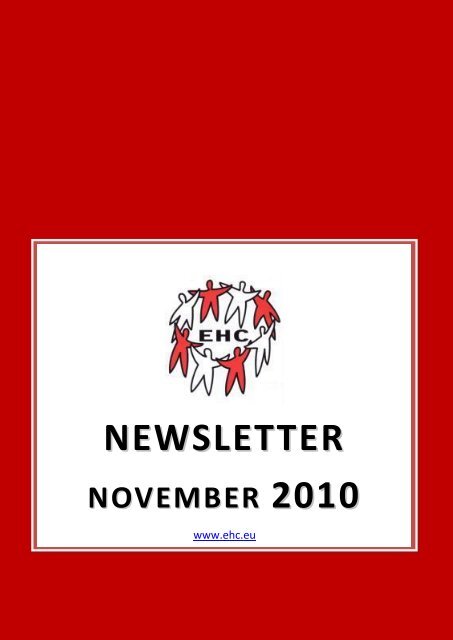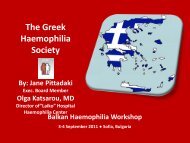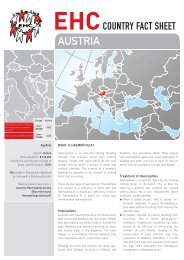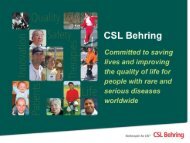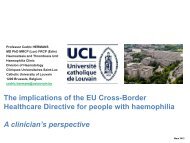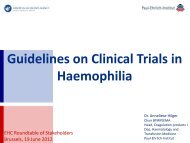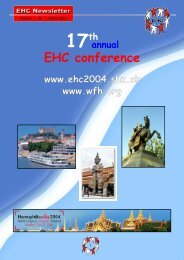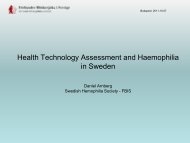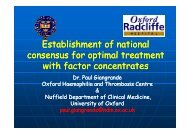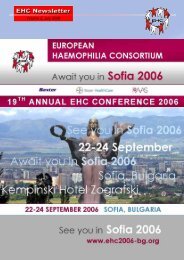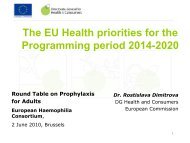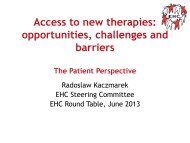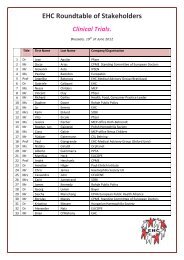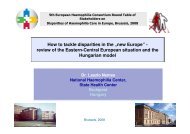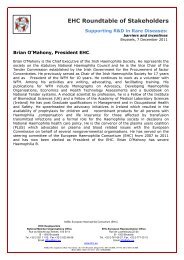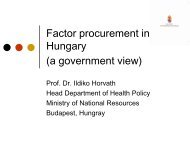2010 November - EHC
2010 November - EHC
2010 November - EHC
Create successful ePaper yourself
Turn your PDF publications into a flip-book with our unique Google optimized e-Paper software.
NEWSLETTER<br />
NOVEMBER <strong>2010</strong><br />
www.ehc.eu<br />
<strong>EHC</strong> Newsletter| NOVEMBER <strong>2010</strong> 1
In the <strong>November</strong> <strong>2010</strong> issue…<br />
THE PRESIDENT’S REPORT p.3<br />
<strong>EHC</strong> NEWS p.5<br />
<strong>EHC</strong> CONFERENCE LISBON p.7<br />
NMO NEWS p.9<br />
<strong>EHC</strong> SUPPORTERS NEWS p.11<br />
EU HEALTH POLICY UPDATE p.15<br />
OTHER EVENTS OF INTEREST p.20<br />
ABOUT <strong>EHC</strong>: The European Haemophilia Consortium (<strong>EHC</strong>) is a<br />
European umbrella organisation representing national member<br />
organisations from 43 countries in Europe. The <strong>EHC</strong> is working to reduce<br />
the burden of the disease on both the individual and on society. Its<br />
mission is to improve the quality of life of people with Haemophilia in<br />
Europe. For more information contact info@ehc.eu<br />
Please note that the <strong>EHC</strong> Supporter News section contains news<br />
submitted by our corporate supporters and is not compiled by <strong>EHC</strong>.<br />
European Haemophilia Consortium<br />
EU Representation Office<br />
Rue du Luxembourg 22-24<br />
BE - 1000 Brussels<br />
Phone: +32 (0)2 761 66 27<br />
Direct Fax: +32 (0)2 777 05 10<br />
Email: info@ehc.eu<br />
Website: www.ehc.eu<br />
European Haemophilia Consortium<br />
Headquarters<br />
National Member Organisations Office<br />
Rue Grisar 38<br />
BE - 1070 Brussels<br />
Phone : +32 (0)2 521 11 50<br />
Direct Fax : +32 (0)2 520 68 66<br />
Email : office@ehc.eu<br />
Website: www.ehc.eu<br />
<strong>EHC</strong> Newsletter| NOVEMBER <strong>2010</strong> 2
THE PRESIDENT’S REPORT<br />
Dear Readers, Members and Friends,<br />
Back from Lisbon, I thank all of you who attended the 23 th<br />
<strong>EHC</strong>-conference. In the first place I thank the hosting NMO. I<br />
congratulate them for the success of the Conference, for the<br />
warm welcome and for the smooth course of the Conference.<br />
With them I congratulate the Conference organizer, without<br />
whom this couldn‟t have been done. I thank the sponsors for<br />
supporting us in the organization of the Annual European<br />
Haemophilia Conference. They provide us the financial possibility to attend the<br />
meetings, to lay contacts at the exhibition hall, they encourage us to improve<br />
our taking care of patients with haemophilia and other bleeding disorders. I also<br />
would present my gratitude to all who have contributed to the scientific level of<br />
this conference: speakers, doctors, nurses, physiotherapists, patients<br />
themselves, … Thanks for those who nursed the patients during the Conference.<br />
Yes, thank you all for your presence and your contribution.<br />
The conference this year aimed some new start in our working. The business<br />
meeting was a sign of this „renewal‟. We had several elections. The General<br />
Assemble elected a new Steering Committee. I congratulate those who are<br />
elected: Mr. Jordan Nedevski as vice-president finance; Dr. Gabriele Calizzani,<br />
Mr. Brian O‟Mahony, Dr. Gábor Varga and Mr. Alain Weill as Steering Committee<br />
members. Dr. Uwe Schlenkrich was asked to join the SC as a co-opted member.<br />
I thank them in advance for their engagement towards the patient organizations<br />
and for all the work they will do. Although they weren‟t elected, I also would<br />
express my gratitude to those who accepted to be a candidate. As Prof. P.<br />
Giangrande expressed after the presentation of all the candidates: “it is<br />
remarkable how strong the candidates are and what a high level of capacities<br />
they present.” This means that they too wanted to put their skills into the<br />
service of the <strong>EHC</strong> and the improvement of patients care. After this election, the<br />
General Assemble choose also the hosting NMO for the <strong>EHC</strong>-conference in 1012.<br />
A tidy competition between three candidates resulted in the election of the Czech<br />
Republic NMO. They will host the 25th <strong>EHC</strong>-Conference in Prague.<br />
The General Assembly approved the relocation of our headquarters to Rue Grisar<br />
38, BE - 1070 Brussels and the fact to work with a CEO. He will take over some<br />
tasks of the EU Representation Office, as for example the newsletter. We thank<br />
the staff of the EU Representation Office for the excellent work they have done<br />
and we appreciate that we still may reckon on their collaboration.<br />
<strong>EHC</strong> Newsletter| NOVEMBER <strong>2010</strong> 3
Together with them, the <strong>EHC</strong> organized in last September the third Round Table<br />
focusing on : “Patient Safety and Haemophilia Care. How to optimize access to<br />
safe medicines and treatment, creating the value of patient safety between<br />
stakeholders.” You will find an excellent report in this newsletter. We had to<br />
postpone the European Parliament Event to next year for the reason that too<br />
many activities were scheduled and managing this would asking too much effort<br />
and resources.<br />
You also will find an article on the event in Poland, where the <strong>EHC</strong> sustained the<br />
Polish Haemophilia Association in its action of better treatment.<br />
The <strong>EHC</strong> , together with Mr. Mark Skinner the president of the World Federation<br />
and the Portuguese Society, had a meeting with the Minister of Health of<br />
Portugal on the occasion of the <strong>EHC</strong>-Conference in Lisbon. They contributed with<br />
success to the strategy for haemophilia care in Portugal.<br />
We just received the news that MEP Mrs. Serracchiani has tabled a written<br />
question on Haemophilia treatment to the European Commission. The<br />
Commission has to reply to this question in 6 weeks. We will keep you informed.<br />
I wish you the best for those two last months of this year and hope to meet you<br />
again at one of our events.<br />
Sincerely yours<br />
Ad Veldhuizen<br />
President <strong>EHC</strong><br />
(some SC-members in discussion at the SC-meeting in Lisbon)<br />
<strong>EHC</strong> Newsletter| NOVEMBER <strong>2010</strong> 4
<strong>EHC</strong> NEWS<br />
<strong>EHC</strong> Round Table on Patient Safety and Haemophilia Care<br />
On 28 September the <strong>EHC</strong> held a Round Table on Patient Safety and Haemophilia Care– How to<br />
optimize access to safe medicines and treatment, creating the value of patient safety between<br />
stakeholders.<br />
The Round Table’s well-timed debate focused<br />
on access to safe medicines and treatment and<br />
followed the European Parliament’s vote on<br />
the pharmacovigilance legislation, which aims<br />
to strengthen transparency and<br />
communication on medicine’s safety issues and<br />
most importantly empower patients to report<br />
adverse effects of new medicines.<br />
Dr. Mike Makris, started his presentation with<br />
the words “ it cannot be any other patient<br />
group that has suffered so much from adverse<br />
events than Haemophilia patients”. The risk<br />
factors, which are well known for this group of patients, have changed significantly for the last three<br />
decades. The pharmacovigilance system helps to identify the new risk factors and make sure that<br />
patient safety is safeguarded. Dr. Markis presented the EUHASS (European Haemophilia Safety<br />
Surveillance) project, which aims to establish a pharmacovigilance programme to monitor the safety<br />
of treatments for people with Haemophilia and develop and maintain a database of all the<br />
Haemophilia centres in Europe. Presenting the first results of the project, Dr. Makris confirmed that<br />
so far, the two main treatments studied, plasma-derived products and recombinant products (i.e.<br />
medicinal products not made from blood, but issued from a manufacturing process used to replicate<br />
the factor molecule), show the same risk.<br />
Prof. Alessandro Gringeri from the University of Milan, further addressed the issue of plasma<br />
derivatives vs. recombinant products. The use of plasma-derived products to treat Haemophilia<br />
patients is still very much associated with the tragedy of the 80s, when many patients were infected<br />
with HIV or Hepatitis B and C through blood donations. Nowadays, the safety product issue balances<br />
between the hypothetical risk of blood borne infections (such as prions) and the real risk of<br />
contracting inhibitors (antibodies). He therefore stressed that the issue of safety concentrates is still<br />
important, and it is crucial for all stakeholders to remain vigilant on the methods and measures<br />
adopted.<br />
Mr. Charles Waller, Vice- President of PPTA Europe (Plasma Protein Plasma Associations) stressed<br />
that the issue of supply products was underestimated in the safety debate, reminding the audience<br />
that “contemporary care should be made available to everyone”. Indeed, the cost of manufactured<br />
products, financial pressure on healthcare authorities, and reimbursement policies will have a<br />
growing impact on the supply of products for patients. These issues should be addressed through<br />
more education, communication and collaboration between industry and patients.<br />
<strong>EHC</strong> Newsletter| NOVEMBER <strong>2010</strong> 5
Views from the regulators, were expressed by the EMA representative, Monica Vinhas, who<br />
explained the importance of the proactive<br />
pharmacovigilance and Risk Management Plan as<br />
set out by the Agency, and the requirements that<br />
need to be provided by companies for marketing<br />
authorisation. The idea behind this process is to<br />
“minimize risks and optimize possible benefits”. The<br />
Risk Management Plan is to evolve with the<br />
adoption of the pharmacovigilance legislation,<br />
which is set to come into force in 2012. In<br />
particular, there will be an evolution toward<br />
benefit risk management plans, more transparency,<br />
better information to patients, and better data<br />
collection.<br />
Finally, the patient views were given by Dr. Uwe Schlenkrich, <strong>EHC</strong> Steering Committee, and Board<br />
member of the German Haemophilia Society. Dr. Schlenkrich presented the history of safety<br />
treatments of Haemophilia patients in Germany since the 70s, and the results of unsafety<br />
treatments, stressing the important role of the patient. Patients, he said, should be included in all<br />
safety, supply and treatment issues, particularly when addressing reduction of costs in the<br />
healthcare system, and the issue of HCV compensation of patients.<br />
Echoing the Round Table exchange, the <strong>EHC</strong> calls for:<br />
� High and constant protection of safety treatments and<br />
products in Haemophilia care<br />
� Proactive pharmacovigilance system which will<br />
empower patients to actively report adverse effects<br />
� Quality information to patients on safety issues<br />
� Equal access to supply products and to treatment<br />
across the EU<br />
<strong>EHC</strong> Newsletter| NOVEMBER <strong>2010</strong> 6
<strong>EHC</strong>-CONFERENCE 22 - 24 OCTOBER LISBON<br />
Advocacy meeting with Government<br />
Centers for hemophilia can already start this year The Health<br />
Ministry will examine the proposal it received to create three<br />
centers specializing in the treatment of hemophilia and other<br />
clotting diseases. The idea is to move forward in 2011. In the<br />
same week that Lisbon hosts for the first time the conference<br />
of the European Haemophilia Consortium (<strong>EHC</strong>), the Assistant<br />
Secretary of State and Health, Manuel Pizarro, received the<br />
president of the WFH and <strong>EHC</strong> and members of other<br />
organizations, including the Portuguese Hemophilia Association<br />
and other congenital coagulopathies who tried to warn for a gap. "By centralizing the monitoring of<br />
patients we ensure a greater expertise and an integrated approach that includes not only the<br />
haematological situation, but also the approach in emergency situations, complications (orthopedic<br />
and other), the psychological counseling, the genetic counseling" explained the Department of<br />
Public Health to PUBLICO. The Ministry could not advance concrete dates nor would confirm that the<br />
centres will be situated in hospitals of Lisbon, Coimbra and Porto.<br />
European Haemophilia Consortium’s point of view<br />
The European Haemophilia Consortium (<strong>EHC</strong>) will bring some ideas to implement haemophilia<br />
centers in Portugal. «The aim is to facilitate the discussion over this matter», says Ad Veldhuizen,<br />
president of <strong>EHC</strong>. «Comprehensive haemophilia care comprises many elements that affect the<br />
quality of the patient’s life». Different treatment methods, different medicines, different<br />
organizational structures<br />
and specialists including<br />
medical doctors, specialist<br />
nurses, physiotherapists<br />
and psychologists play, all<br />
together, an important<br />
role in comprehensive<br />
care», he adds.<br />
(F.l.t.r. Mrs. Maria de Lourdes<br />
Fonseca, vice president of the<br />
Portuguese Haemophilia<br />
Association, Ad Veldhuizen<br />
President <strong>EHC</strong>, Dr. Alice Tavares,<br />
chairman of the Conference)<br />
«These centers will be<br />
helpful, not only for<br />
people with haemophilia,<br />
but, also, to other bleeding<br />
<strong>EHC</strong> Newsletter| NOVEMBER <strong>2010</strong> 7
disorders. Comprehensive health care centers (that were born six years ago) are implanted already<br />
in more than 20 countries in Europe like in: Ireland, UK, Germany, Belgium, Netherlands, France, etc.<br />
And comprehensive health care will cover all sites of treatment», completes.<br />
In his perspective, «comprehensive health care is more cost-effective and for instance a good way to<br />
improve quality of life in patients with haemophilia». Taking the example of other countries, patients<br />
should go twice a year to centers to receive a medical treatment plan. After that, they can follow the<br />
treatment in local hospital. «In this centers we have all the disciplines and the treatment is<br />
concentrated. »<br />
This measure is very useful not only for children but patients with co-morbidities such as HIV positive<br />
and infected with hepatitis. «Although patients have to travel to the centre, at the end, patients can<br />
achieve a lot of benefits. We have learned by following examples of other countries that the cost<br />
have crash down with comprehensive health care centers, because in this places experts are<br />
available to treat patients who suffered of haemophilia in a efficient way.» Also as hospitalisation<br />
went down with 40%, quality of live for the patient is much better now.<br />
The social cost is lower because when the patient has a better treatment his functionality to work or<br />
to go to school, reducing the days missed, increases, for instance. «This multidisciplinary approach<br />
needs to be applied in efficient care and treatment centers to ensure its full benefits. The <strong>EHC</strong> would<br />
like to improve the progress on these elements in Portugal, giving some advices and tools to start<br />
implementation soon», concludes Ad Veldhuizen.<br />
(text published in the newspaper edited during the <strong>EHC</strong>-conference)<br />
Welcome of the President of the “Associação Portuguesa<br />
de Hemofilia e de outras Coagulopatias Congénitas” (APH)<br />
Lisbon is the chosen place to perform the 23rd Annual Conference of European Consortium of<br />
Haemophilia (CEH), a meeting organized by Portuguese Association of Haemophilia and other<br />
Congenital Coagulopathies (APH) and CEH. According to João Paulo Silva, the president of APH, this<br />
meeting aims «to disclose haemophilia and promote the understanding of all the issues related to<br />
this disease, in order to improve haemophilia and other congenital bleeding disorders’ treatment, as<br />
well as implement references centers to treat patients».<br />
João Paulo Silva hopes that this event «can be an opportunity to boost universal criteria for the<br />
treatment of these diseases throughout the country – guidelines». In addition, this meeting «can be<br />
a change to attract more medical doctors and teams with specific expertise in the multidisciplinary<br />
treatment of haemophilia and other congenital coagulopathies», he says.<br />
«For APH, the Conference of the European Consortium of Haemophilia has a great value. We cannot<br />
forget that this meeting is one of the most significant scientific events in Europe and all over the<br />
world in this area. For us, is an honor to receive the leading experts in haemophilia and congenital<br />
bleeding disorders in Portugal», indicates.<br />
<strong>EHC</strong> Newsletter| NOVEMBER <strong>2010</strong> 8
The goal of this meeting is to expand the knowledge «not only for technicians and physicians who<br />
manage these problems in clinical practice, but either to policymaker and general public».<br />
As a patient with haemophilia, the president of APH highlights the importance of an event with this<br />
dimension, such as CEH, patient’s quality of life. This is an opportunity to update information. João<br />
Paulo Silva also remarks the importance of driving the information to general public – a way to<br />
demystify haemophilia. «One of our major concerns is the fact that haemophilia stills unknown to<br />
the generality of medical doctors, nurses, paramedics and INEM».<br />
Finally, the president of APH leaves a message of hope: «My desire is to expand haemophilia and<br />
other congenital bleeding disorders out of borders, in order to improve the treatment and the<br />
patients’ quality of life.»<br />
(text published in the newspaper edited during the <strong>EHC</strong>-conference)<br />
The complete version of this publication is downloadable on www.ehc.eu<br />
NMO NEWS<br />
Ireland - New Publications on Women and Bleeding<br />
Disorders and Rare Bleeding Disorders<br />
The Irish haemophilia Society has published new booklets<br />
on Women and Bleeding Disorders and on rare Bleeding<br />
Disorders. These comprehensive booklets are aimed at the<br />
large number of these demographic groups who do not<br />
always avail of the information and services available from<br />
national haemophilia patient organizations stated Brian o<br />
Mahony, Chief Executive of the I H S. The booklets can be<br />
downloaded from the I H S website www. haemophilia.ie.<br />
The Irish Haemophilia Society are also happy to mail<br />
copies free of charge to any Haemophilia Society.<br />
<strong>EHC</strong> Newsletter| NOVEMBER <strong>2010</strong> 9
Haemophilia Care in Poland<br />
On 7th September <strong>2010</strong> an international conference “Haemophilia Care in Poland – Current State of<br />
Affairs” took place in Warsaw, Poland. The conference was jointly organized by the Polish<br />
Haemophilia Society and the <strong>EHC</strong>, and the Polish Minister of Health Ewa Kopacz was its official<br />
patron. The speakers included Dr Paul Giangrande, haematology consultant from Oxford Radcliffe<br />
Hospital, Brian O’Mahony, Chief Executive of the Irish Haemophilia Society, Dr Joanna Zdziarska, a<br />
haematologist from the University Hospital in Cracow, Poland, and Bogdan Gajewski, President of<br />
the Polish Haemophilia Society. Also representatives of people with haemophilia and some parents<br />
of children with haemophilia had a chance to express their opinions. The debate was efficiently<br />
moderated by journalist Malgorzata Wisniewska.<br />
The speakers underlined that the introduction of prophylactic treatment for children in 2008 was a<br />
very significant step forward in haemophilia care in Poland. However, there remained many<br />
problems to be solved.<br />
The most important were:<br />
� lack of comprehensive haemophilia care, including problems with access to physiotherapy;<br />
� lack of secondary prophylaxis for adults with serious joint changes;<br />
� wrong costing of medical procedures by the National Health Fund, which was the reason<br />
that hospitals often lost money when treating patients with haemophilia;<br />
� no comprehensive treatment for patients with inhibitors;<br />
� necessity of continuing the existing National Programme of Haemophilia Treatment, which<br />
will expire in 2011;<br />
� no access to recombinant factor concentrates.<br />
When referring to the latter point, Dr Giangrande stressed the fact that prices of plasma-derived and<br />
recombinant factor concentrates had become comparable, and in the most recent tender organized<br />
in the United Kingdom plasma-derived factor concentrates (bought only for patients with von<br />
Willebrand disease as otherwise British patients rely on recombinants) were more expensive than<br />
recombinants.<br />
<strong>EHC</strong> Newsletter| NOVEMBER <strong>2010</strong> 10
Dr Giangrande pointed also out that switching over from plasma-derived factor concentrates to<br />
recombinants did not cause any increase in inhibitor frequency.<br />
Praising the progress made in Polish haemophilia care, Brian O’Mahony added that still further steps<br />
were necessary to fulfill the European Principles of Haemophilia Care. He underlined that patients<br />
should have access to the full range of concentrates, including both recombinant and plasma<br />
derived. Recombinant concentrates form 100 per cent of the supply in Ireland and 40 per cent in<br />
Hungary. Patients should also have a chance to participate in making decisions concerning the state<br />
health policy as far as haemophilia was concerned.<br />
During the debate parents and journalists asked about reasons for the existing delays in introducing<br />
a modified version of the programme of prophylaxis for children. Representatives of the National<br />
Health Fund and the Ministry of Health explained that the delay had been caused by organization<br />
problems and that soon the new version should be implemented.<br />
The conference found a large echo in the media, with articles published in several magazines and<br />
some materials, including an interview with Dr Giangrande and Brian O’Mahony, broadcast by state<br />
television.<br />
There was also a direct gain for people with haemophilia in Poland as the National Health Fund<br />
decided to revise its costing of endoprosthetic surgery in haemophilia. This in turn resulted in a<br />
change of the attitude of hospitals. Currently up to eight such surgeries a month are made in the<br />
Institute of Haematology and Transfusion Medicine in Warsaw, and some more are made in Cracow.<br />
Adam Sumera<br />
Vice-President, Polish Haemophilia Society<br />
<strong>EHC</strong> SUPPORTERS NEWS<br />
How comprehensive care creates value for individuals and society<br />
(Baxter Symposium held at the 23 th <strong>EHC</strong>-conference in Lisbon)<br />
Comprehensive care adds significant value<br />
for individuals and society and requires<br />
appropriate funding. As the management<br />
of haemophilia is complex, patients should<br />
have access to a range of services, which<br />
are described by the European Principles<br />
of Haemophilia Care. Clinicians, patient<br />
groups and industry must make their voice<br />
heard so that payers not only know the<br />
cost of treatment, but also understand its<br />
values. This was the strong opinion of the<br />
speakers at the Baxter symposium.<br />
(f.l.t.r.: Declan Noone, Kate Khair, Brian O’Mahony,<br />
Prof. Cedric Hermans)<br />
<strong>EHC</strong> Newsletter| NOVEMBER <strong>2010</strong> 11
Today, effective treatment of haemophilia goes far beyond stopping acute bleeding.<br />
Comprehensive care helps patients lead an active live that is as normal as possible. At the <strong>EHC</strong>-<br />
Conference <strong>2010</strong> in Lisbon on October the 23th a symposium, sponsored by Baxter, focused<br />
precisely on this question: “Governments know the cost of treatment, but do they know the<br />
value?”<br />
Prevention of life-threatening bleeds and joint damage, fewer missed work days, freedom from<br />
pain and anxiety – these are just some examples of how comprehensive care creates value. Its<br />
cornerstones are described in the European Principles of Haemophilia Care which were<br />
developed by an interdisciplinary working group of 45 leading haemophilia physicians from 19<br />
European countries. The Principles call for a national haemophilia organization, patient registries,<br />
comprehensive care centres, the supply of safe medicines, home treatment, prophylaxis and<br />
education and research programs in every country.<br />
Level of funding determines quality of healthcare<br />
“Funding is the biggest determinant of the quality of healthcare provided in any country,” said<br />
Professor Cedric Hermans of the Catholic University of Louvain, Belgium. Despite much variation<br />
in healthcare systems across Europe, every country is experiencing increasing pressure on<br />
healthcare funding, which may impact patient care, prescriber freedom and research and<br />
innovation in haemophilia.<br />
At the same time, major challenges to maintaining and improving the standard of care in this<br />
region need to be resolved. “To ensure consistency of care throughout Europe, increasing<br />
access to recombinant products, prophylaxis and immune tolerance therapy has to be made<br />
available,” emphasized Cedric Hermans. “The implementation of the European Principles of<br />
Haemophilia Care should contribute to getting the best value out of haemophilia care.”<br />
A variety of EU patient interest groups and medical organizations increasingly lobby for adequate<br />
funding to ensure access to care. However, unlike other medical conditions, haemophilia is a<br />
lifelong disease which requires extensive care and careful management. Adequate funding<br />
needs to be protected to not only preserve patients’ physical care, but also their overall quality of<br />
life for their lifetime.<br />
Cedric Hermans called upon the audience to make their voices heard so that comprehensive<br />
care, as described by the European Principles, is ensured: “Clinicians, patient groups and<br />
industry must educate payers on haemophilia and engage with them so that physicians and<br />
patients are heard when funding decisions are made.”<br />
Home care – better quality of life and fewer hospital visits<br />
Home therapy as a treatment option has existed for 30 years. It is a compelling story of living a<br />
nearly normal life despite a severe disease. Access to home treatment and delivery is one of the<br />
European Principles of Haemophilia Care.<br />
<strong>EHC</strong> Newsletter| NOVEMBER <strong>2010</strong> 12
In her presentation on home care, Kate Khair, a nurse at the Great Ormond Street Hospital for<br />
Children in London, explained what a difference home care has made in the life of Jenny and<br />
James: James was 18 months old when he first came to the hospital. His three-and-a-half-yearold<br />
sister Jenny had to accompany him on his many visits and could not go to nursery. A nearly<br />
normal life for Jenny only began when James started home treatment.<br />
As a result of home care, the family caregivers generally experience some tangible benefits too:<br />
due to the reduced number of hospital stays, they have to take less time off work and disruption<br />
to family life is minimised. Moreover, fewer hospital visits have a clear financial advantage. Kate<br />
Khair: "Home care has saved Great Ormond Street Hospital £1.3 million per year for the past six<br />
years.”<br />
Home care is also a continuous learning experience for patients, physicians, nurses and<br />
caregivers who become valued partners of the healthcare team. Today, comprehensive home<br />
care programs educate patients and caregivers about the treatment, the medicines and most<br />
importantly when to contact a centre for help and support.<br />
New innovations are being developed to make home treatment as easy as possible, for instance,<br />
through home delivery of products, physiotherapy and smartphone applications that help to<br />
ensure compliance. Kate Khair summarized: “Home care is here to stay, we can prove it is<br />
effective and benefits patients and their families.”<br />
The foundation of comprehensive care – safe and effective medicine<br />
Factor replacements have revolutionized the treatment of haemophilia. The European Principles<br />
of Haemophilia Care refer to medicines as one important element of comprehensive care:<br />
“People with haemophilia need to have access to safe and effective treatment at optimum<br />
levels.”<br />
The economic value of safe and effective medicines is huge: fewer orthopaedic surgeries and<br />
days in hospital, less time taken off work and education, the ability to pay taxes and generally to<br />
be an active member of society are just some examples. “In the past, unsafe medications<br />
resulted in high costs because patients needed, for instance, to be treated for HIV and hepatitis,”<br />
Declan Noone, a person with haemophilia and member of the Irish Haemophilia Society in<br />
Dublin, Ireland, reminded the audience.<br />
Criteria for selection of a specific product include safety, quality and efficacy. Declan Noone<br />
concluded his presentation with a personal plea: “The human cost of safe and effective treatment<br />
should always outweigh the monetary costs.”<br />
Prophylaxis for adults – better quality of life and fewer days off work<br />
The benefits of primary prophylaxis for children are now widely accepted: children with severe<br />
haemophilia who begin prophylactic treatment at an early age and continue into early adulthood<br />
have very little or no joint damage and excellent quality of life . Many European countries<br />
recognize this fact by making prophylactic treatment available for children and even adults. One<br />
example is Sweden: the quality of life of young adults with haemophilia in Sweden today is<br />
significantly better than in other countries due to early and sustained prophylaxis.<br />
“Prophylaxis for adults should also be considered,” stated Brian O’Mahony, Chief Executive of<br />
the Irish Haemophilia Society in Dublin, Ireland, in his presentation. “Secondary or intermittent<br />
prophylaxis in adults is beneficial and cost effective. It should be looked at on a case-by-case<br />
basis.”<br />
<strong>EHC</strong> Newsletter| NOVEMBER <strong>2010</strong> 13
Study results support his view. As demonstrated in Italy and the UK, secondary prophylaxis was<br />
effective in preventing total bleeds and joint bleeds in adults with severe haemophilia . Access to<br />
prophylactic therapy is also one of the European Principles of Haemophilia Care.<br />
Whereas some benefits, for instance “missed work days”, are easily measurable and can be<br />
balanced with costs, others are not. Avoidance of pain and suffering, the pursuit of an education<br />
or career, raising a family, enjoying normal activities, the ability to travel and freedom from<br />
anxiety and restrictions – the list of benefits without a price tag is long. Brian O’Mahony<br />
concluded his presentation by commenting: “We need to work to ensure that governments,<br />
health ministries and health economists focus on the value of haemophilia treatment in addition<br />
to cost.”<br />
Expert Meeting on von Willebrand disease on Åland Islands<br />
Thirty-eight experts from 18 countries gathered on the Åland Island Meeting to discuss the treatment<br />
and science of von Willebrand disease on 22nd- 25th September, <strong>2010</strong>, on invitation of Prof. Erik<br />
Berntorp, University of Lund, Sweden with financial support from Octapharma .<br />
One of the first patients described with von Willebrand disease was Hjördis S., a little girl from the<br />
Åland Islands, located halfway between Finland and Sweden in the Baltic Sea. In 1924, she was taken<br />
to the doctor because of a history of serious bleeds. Only one year old, she fell and had a nose bleed<br />
for an “unusually long time”. At age three, she fell again and had a cut in her upper lip. After three<br />
days of heavy bleeding, the child became almost unconscious and recovered only after 10 weeks in<br />
bed. Other family members also suffered from severe bleeds. All but two of her 11 siblings had a<br />
history of bleeding. Three of Hjördis’s siblings died at age two and four from uncontrolled bleeds.<br />
Erik von Willebrand published his observations of Hjördis family and other families on Åland islands<br />
what he called “hereditary pseudohaemophilia”, occurring equally in men and women, and showing<br />
<strong>EHC</strong> Newsletter| NOVEMBER <strong>2010</strong> 14
a strong family manifestation. He described the new bleeding disorder in the publication ”Hereditary<br />
Pseudohaemophilia in ”Finska Läkaresällskapets Handlingar” in 1926.<br />
Tragically, Hjördis bled to death during her fourth menstrual period only 14 years old. But the<br />
publication on her disease initiated research that furthered significant developments in the field of<br />
von Willebrand disease over the world.<br />
International experts therefore chose this historic scene to meet and discuss aspects of VWD<br />
research in eight sessions covering biochemistry, immunology, diagnosis, classification, genetics,<br />
treatment and disease management, gene therapy, and current guidelines for the treatment of<br />
VWD.<br />
The four-day meeting also included a study excursion to the Föglö Islands visiting the house of<br />
Hjördis. Exceptional lectures given by Otto Lindberg, the great grandson of E. von Willebrand<br />
familiarizing the audience not only with the biography but also with the person Erik. von Willebrand<br />
and Margareta Blombäck, a pioneer in the research on VWD, made this journey an extraordinary<br />
experience.<br />
The closing session gave an overview of the different national and regional guidelines for the<br />
treatment of VWD and resulted in the decision to institute the Åland Island working group with<br />
drafting an up-to-date European guideline based on the results of the Åland Islands Meeting in<br />
cooperation with EAHAD (European Association of Haemophilia and Allied<br />
Disorders).<br />
Proceedings are planned to be published in the beginning of 2011.<br />
EU HEALTH POLICY UPDATE<br />
European Parliament adopts second reading the draft<br />
directive on patient rights in cross-border healthcare<br />
On 27 October the European Parliament’s Public Health Committee<br />
adopted in second reading (by 47 votes to 2 with 1 abstention) the<br />
draft report by MEP Françoise Grossetête (EPP, FR), on the<br />
proposal for a directive on patients rights in cross border<br />
healthcare. This second vote reading pave the way for the vote in<br />
plenary of the draft legislation, scheduled for 18 January 2011.<br />
The vote follows the adoption by the Council on a compromised text in first reading under the lead<br />
of the Belgium Presidency on 13 September. The compromise reached by the Council reflects the<br />
Council's intention to fully respect the case law of the European Court of Justice on the patients'<br />
rights in cross-border healthcare while preserving Member States' rights to organise their own<br />
healthcare systems. The vote in Committee also reflects the will by MEPs to guarantee that patients<br />
covered for a treatment in their home country can receive the same treatment in another EU<br />
country, and be reimbursed without prior authorisation up to the level they would have received in<br />
their home country.<br />
“The European Parliament wished to avoid the risk of legal uncertainty for the patient, stating clearly<br />
the cases where a Member State may refuse a reimbursement or the right to seek treatment<br />
abroad", said Rapporteur Françoise Grossetête.<br />
<strong>EHC</strong> Newsletter| NOVEMBER <strong>2010</strong> 15
Most importantly, MEPs decided to add special rules for patients with rare diseases, stressing that<br />
"patients affected or suspected to be affected by rare diseases have the right to access healthcare in<br />
another Member State and to receive reimbursement even if the diagnosis and/or treatment in<br />
question is not provided for by the legislation" of the home Member State. Such treatment should<br />
however, be subject to prior authorisation.<br />
According to a Eurobarometer study, 4% of Europeans received medical treatment in another EU<br />
Member State in 2006-2007. Cross-border healthcare is in fact more frequent for the treatment of<br />
rare diseases and in border regions, smaller Member States and areas with large numbers of<br />
tourists.<br />
Next Steps<br />
� 18 January 2011: EP plenary sitting, 2nd reading (indicative date)<br />
Additional information<br />
� EP Draft Recommendation for Second Reading:<br />
http://www.europarl.europa.eu/sides/getDoc.do?pubRef=-//EP//NONSGML+COMPARL+PE-<br />
443.081+02+DOC+PDF+V0//EN&language=EN<br />
� The Council first-reading position on a draft Directive concerning the application of patients'<br />
rights in cross-border healthcare:<br />
http://www.consilium.europa.eu/uedocs/cms_Data/docs/pressdata/en/lsa/116482.pdf<br />
Better protection of patients in the use medicines: the<br />
European Parliament adopts a legislation on<br />
pharmacovigilance<br />
Substantial progress was made on the pharmacovigilance dossier of the<br />
“pharmaceutical package” leading to its adoption at the European<br />
Parliament plenary session on 22 September <strong>2010</strong>.<br />
The European Parliament report drafted by Rapporteur Linda McAvan,<br />
adopted by the Parliament on 22 September strengthens the initial<br />
proposal of the European Commission towards more public health safety, transparency and<br />
communication on medicine’s safety issues. In particular, it empowers patients who will be able to<br />
report adverse effects of new medicines using national web portals and a European portal. All new<br />
or updated medicines will be intensely monitored for five years, and doctors and patients will be<br />
informed and encouraged to report all problems.<br />
The Community pharmacovigilance database, “EudraVigilance” will also be further developed and<br />
strengthened, to become a single point of receipt for pharmacovigilance information.<br />
Besides, post-authorisation safety studies will be conducted in real-world populations and real-life<br />
conditions. The new legislation will also allow for stricter, but simpler rules on monitoring and<br />
reporting by drug companies.<br />
<strong>EHC</strong> Newsletter| NOVEMBER <strong>2010</strong> 16
Finally, a “Pharmacovigilance Risk Assessment Committee” will be created within the EMA, which<br />
will be solely responsible for pharmacovigilance and risk assessment, and will be made up of one<br />
representative per member state, six additional members appointed by the Commission, a patients'<br />
representative and another representative of the health sector. The European Medicines Agency<br />
welcomed the vote: “this is a major step towards the legislation coming into force, currently<br />
expected for mid-2012”.<br />
Next Steps<br />
� Council to formally endorse the proposal<br />
� Legislation come into force mid 2012<br />
Additional Information<br />
� Please click here to access the ENVI report of Linda McAvan on pharmacovigilance<br />
Progress on Information to Patients proposal<br />
On 28 September <strong>2010</strong>, the Environment and Health Committee voted on the Information<br />
to Patient report, opening the way forward for the adoption of the second legislative<br />
proposal of the “Pharmaceutical Package”.<br />
The draft report of Rapporteur Christopher Fjellner (EPP, Sweden) was adopted by a<br />
majority of MEPs in the ENVI Committee. The new draft focuses on patients’ rights<br />
rather than industry’s rights. It introduces in particular amendments to the legislation,<br />
which oblige Member States to ensure that "objective, unbiased information" is<br />
available to the general public on medicinal products sold in that Member State.<br />
Information should include: a summary of product characteristics, a labeling and package<br />
leaflet, a publicly accessible version of the assessment report of the medicinal product, the diseases<br />
and health conditions which are to be treated with the medicinal product, and information on how<br />
to prevent such diseases and conditions.<br />
Pharmaceutical companies should be required, and not just have the option as in the Commission<br />
proposal, to make available the approved and most recent contents of summaries of product<br />
characteristics, labelling and package leaflet and a publicly accessible version of the assessment<br />
report.<br />
In addition, pharmaceutical companies will be allowed to provide the general public with other welldefined<br />
non-promotional information on the environmental impact of the product or its effect on<br />
prices, following prior authorisation from the competent authorities.<br />
This information would have to be supplied both in electronic and printed form and appropriate<br />
format for the disabled, but it will be banned from printed newspapers or magazines.<br />
Besides, MEPs voted that the Commission will have to produce a report on Member States’ practices<br />
three years of the legislation enters into force. The Commission will also have to publish an<br />
assessment of improvements that could be made to the summary of product characteristics and the<br />
information leaflet after two years.<br />
Ahead of the plenary vote on 24 <strong>November</strong>, the Association Internationale de la Mutualité (AIM),<br />
Health Action International (HAI) Europe, the International Society of Drug Bulletins (ISDB) and the<br />
<strong>EHC</strong> Newsletter| NOVEMBER <strong>2010</strong> 17
Medicines in Europe Forum (MiEF) have called MEPs to oppose the Commission’s proposal with<br />
regard to the public provision of information relating to drugs subjected to medical regulation,<br />
specifically for a directive to modify Directive 2001/83/CE and a regulation to modify (EC)726/2004.<br />
According to them, the proposal would generate more bureaucracy, expose patients to greater risks<br />
and bring additional costs for member states, which would have to deal with the consequences.<br />
Next Steps<br />
� 24 <strong>November</strong>: first reading vote of the European Parliament plenary<br />
European Health Forum Gastein addresses healthy ageing<br />
The 13 th European Health Forum<br />
Gastein (EHFG) was held on 6-9<br />
October <strong>2010</strong> and focused on<br />
“Creating a better future for Health”.<br />
Issues such as health literacy and investment in a healthy workforce, the growing ageing population,<br />
cost-saving measures were tackled. On the issue of ageing, EHFG president Prof. Günther Leiner,<br />
called the EU and governments to put in place a European fund for the aged that would help<br />
compensate for the deficit in available care for older people. “Everyone should be able to age in<br />
dignity in Europe, not just in a few member countries” he stressed. He believes such a fund could be<br />
created at the image of the European Regional Development Fund (EFRE) which aims to reduce<br />
economic development inequalities across European regions. He also believes that “such a measure<br />
would be fully within the spirit of the European Commission’s Europe 2020 strategy, a leading<br />
initiative for ensuring economic, social and territorial cohesion by helping the poor and socially<br />
excluded.”<br />
(poster presented by EUHASS at the Forum)<br />
Health Commissioner Dalli also addressed the issue of<br />
ageing in his keynote speech. He mentioned in particular<br />
that as part of the European Commission initiative on an<br />
“Innovation Union” by 2020, an “Innovation Partnership<br />
on Healthy and Active Ageing” will be created.<br />
Commissioner Dalli stressed that the aim of the<br />
partnership is to “increase by two years the number of<br />
years that Europeans can live an active and healthy life.”<br />
The new initiative will bring together governments, civil<br />
society, industry and the European Commission to deliver<br />
concrete innovative solutions to meet the needs of<br />
patients.<br />
(Poster made and presented by EUHASS at the Forum)<br />
Additional information<br />
Information on the 13 th European Health Forum Gastein:<br />
http://www.ehfg.org/index.php<br />
<strong>EHC</strong> Newsletter| NOVEMBER <strong>2010</strong> 18
European Medicine Agency publishes first review of orphan<br />
designation documents<br />
The Agency published on 17 September the first of its ‘review of<br />
orphan designation’ documents. These documents summarise<br />
the review of the orphan designation carried out by the<br />
Committee for Orphan Medicinal Products (COMP) whenever an<br />
orphan medicine reaches marketing authorisation. The review is<br />
carried out to check that the criteria underpinning the<br />
medicine’s orphan designation still apply.<br />
The publication of these documents has been introduced in order to increase transparency over the<br />
Agency’s orphan designation process. The documents summarise the COMP’s position on whether<br />
the orphan designation for a medicinal product that is receiving marketing authorisation should be<br />
maintained or revoked, and include a discussion on the justification of benefit over other authorised<br />
treatments.<br />
The first review document concerns Vpriv (velaglucerase alfa), which was authorised for the<br />
treatment of Gaucher disease on 26 August <strong>2010</strong>. The COMP concluded that Vpriv’s orphan<br />
designation can be maintained on 8 July <strong>2010</strong>.<br />
The Agency will continue to publish these documents for all orphan medicinal products at the time<br />
of marketing authorisation, and for all extensions of indication approved for orphan medicines<br />
already on the market.<br />
Additional Information:<br />
The EMA press release and supporting materials are available at :<br />
http://www.ema.europa.eu/ema/index.jsp?curl=pages/news_and_events/news/<strong>2010</strong>/09/news_det<br />
ail_001114.jsp&murl=menus/news_and_events/news_and_events.jsp&mid=WC0b01ac058004d5c1<br />
<strong>EHC</strong> Newsletter| NOVEMBER <strong>2010</strong> 19
OTHER EVENTS OF INTEREST<br />
EUROPLAN rare disease national conferences, May-<br />
December <strong>2010</strong>, across Europe<br />
15 national conferences organized within the framework of EUROPLAN, a EU funded project, to<br />
promote national plans and strategies for rare diseases based on EU Council Recommendation<br />
For more information here<br />
11th Partnering for Rare Diseases Therapy Development –<br />
Workshop, 29-30 <strong>November</strong>, Prague, Czech Republic<br />
The workshop will concentrate on:<br />
� Science - the determinants of research in rare disease in Europe:<br />
understanding the current and future European Research and<br />
Development challenges and opportunities.<br />
� Regulation - the Europe and beyond: developing future regulations<br />
and policies for better rare disease therapies.<br />
� Sustainable Access - The reality we face to improve access to and<br />
affordability of orphans.<br />
For more information here<br />
Please note that the World Orphan Drug Congress will take place on Monday 29 <strong>November</strong> -<br />
Wednesday 1 December, Crowne Plaza, Geneva, Switzerland.<br />
Please click here to access all information about the congress.<br />
<strong>EHC</strong> Newsletter| NOVEMBER <strong>2010</strong> 20
A European Strategy for Chronic Conditions – Presidency<br />
Conference, 9 December, Brussels<br />
For more information here<br />
EPPOSI invites all stakeholders to its Second Workshop on Chronic<br />
Conditions to help formulate the principal elements of a holistic new<br />
model which can actively reduce the debilitating personal and economic<br />
burden of chronic conditions. The model will be developed by a Task<br />
Force, to be set up after the workshop and based on its outcomes,<br />
which can be adapted and implemented in all Member States.<br />
2nd Workshop on Registries for Rare Disorders, 25-26<br />
January 2011, Brussels, Belgium<br />
The workshop will focus on:<br />
� The use of registries to support patients access<br />
� The use of registries to meet payers' needs<br />
� The role of registries to support scientific advances<br />
For more information here<br />
4 th Annual Congress of EAHAD, 20-4 February 211, Geneva<br />
More information see www.eahad2011.ch<br />
<strong>EHC</strong> Newsletter| NOVEMBER <strong>2010</strong> 21


